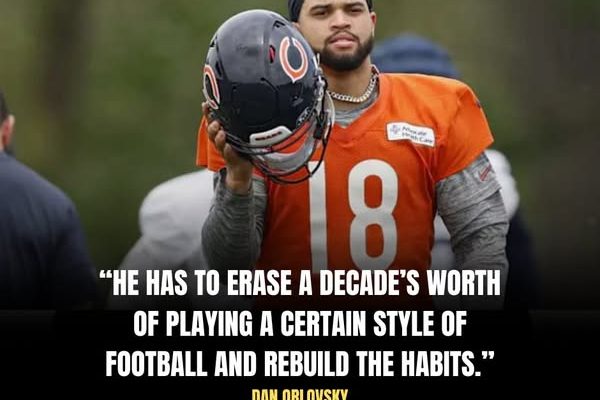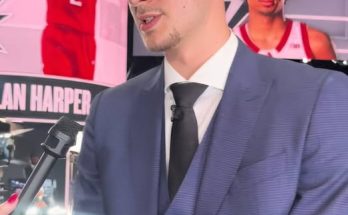**Dan Orlovsky on Caleb Williams’ Challenge Ahead: “New System, New Habits. It Won’t Happen Overnight.”**
Transitioning from college football to the NFL is one of the most daunting challenges any young quarterback can face. For Caleb Williams, the No. 1 overall pick in the 2024 NFL Draft, the expectations are sky-high, but the reality of his situation is far more complex than many realize. Former NFL quarterback and current ESPN analyst Dan Orlovsky has been vocal about the hurdles Williams will face, emphasizing that success won’t come instantly. “New system, new habits. It won’t happen overnight,” Orlovsky recently stated, capturing the essence of what lies ahead for the Chicago Bears’ new franchise quarterback.
Williams enters the league with a rare combination of arm talent, creativity, and poise under pressure—traits that made him a Heisman Trophy winner and the most coveted prospect in his class. However, as Orlovsky points out, the NFL is a different beast. The speed of the game, the complexity of defenses, and the demand for precision in every throw are all amplified at the professional level. Even the most gifted college quarterbacks must undergo a significant adjustment period, and Williams is no exception.
One of the biggest challenges Williams will face is mastering a new offensive system. In college, he operated in Lincoln Riley’s quarterback-friendly scheme at Oklahoma and USC, which emphasized spacing, quick reads, and playmaking outside the pocket. While that system prepared him for many aspects of NFL play, the Bears’ offense under coordinator Shane Waldron will demand more from him in terms of pre-snap adjustments, progression reads, and timing within a structured passing game. Orlovsky, who played in multiple systems during his NFL career, understands how difficult this transition can be. “In college, you can get away with freelancing when things break down. In the NFL, you have to win from the pocket first,” he explains. “That means understanding coverages, knowing where your outlets are, and getting the ball out on time. It’s a mental leap as much as a physical one.”
The development of new habits is another critical factor in Williams’ early career. College stars often rely on their natural ability to dominate, but NFL defenses are too sophisticated for that approach to work consistently. Orlovsky stresses the importance of refining mechanics, footwork, and decision-making—all of which must become second nature. “The great quarterbacks in this league don’t just have talent; they have discipline,” Orlovsky says. “They trust their footwork, they trust their progressions, and they don’t panic when the first read isn’t there. Caleb has to build those habits from the ground up.”
Footwork, in particular, is an area where Williams will need to focus. While his ability to extend plays is a strength, NFL pass rushes are faster and more disciplined than what he faced in college. Sloppy footwork under pressure can lead to inaccurate throws or turnovers, something the Bears cannot afford if they hope to compete in a tough NFC North. Orlovsky notes that even Patrick Mahomes—a quarterback Williams is often compared to—had to refine his footwork early in his career to maximize his efficiency within the Chiefs’ system. “Caleb has the arm to make any throw, but if his feet aren’t right, it doesn’t matter,” Orlovsky says. “That’s something he’ll have to drill every single day.”
Another challenge for Williams will be managing expectations—both his own and those of the fanbase. Chicago has been searching for a franchise quarterback for decades, and the hype surrounding Williams is immense. The Bears have surrounded him with weapons, including DJ Moore, Keenan Allen, and rookie Rome Odunze, but Orlovsky cautions that immediate success is far from guaranteed. “Fans want to see fireworks right away, but the reality is that most young quarterbacks struggle early,” he says. “Even Peyton Manning threw 28 interceptions as a rookie. The key is growth over time.”
Orlovsky also highlights the importance of patience from the Bears’ coaching staff. Head coach Matt Eberflus and Waldron must balance putting Williams in positions to succeed while also allowing him to learn from mistakes. “You can’t coach the creativity out of him, but you have to help him understand when to take risks and when to play it safe,” Orlovsky explains. “That’s a delicate balance, and it takes time.”
The mental aspect of the game may be Williams’ biggest test. NFL defenses are designed to confuse quarterbacks, disguising coverages and applying pressure in ways that college defenses simply cannot. Orlovsky, who has studied countless hours of film, knows how overwhelming it can be for a rookie. “The game slows down with experience, but early on, everything feels fast,” he says. “Caleb will see looks he’s never seen before, and how he processes those moments will determine his early success.”
Despite the challenges, Orlovsky remains optimistic about Williams’ long-term potential. “He has all the tools—arm talent, mobility, intelligence—but it’s about putting it all together,” he says. “The great ones figure it out, but it rarely happens in Year 1.” History supports this perspective. Josh Allen, Jalen Hurts, and even Lamar Jackson needed time to develop into the stars they are today. The Bears must afford Williams the same patience.
In the end, Caleb Williams’ rookie season will be a learning experience. There will be flashes of brilliance and moments of frustration. As Dan Orlovsky wisely notes, “New system, new habits. It won’t happen overnight.” But if Williams can embrace the process, the rewards could be extraordinary. The journey begins now.



